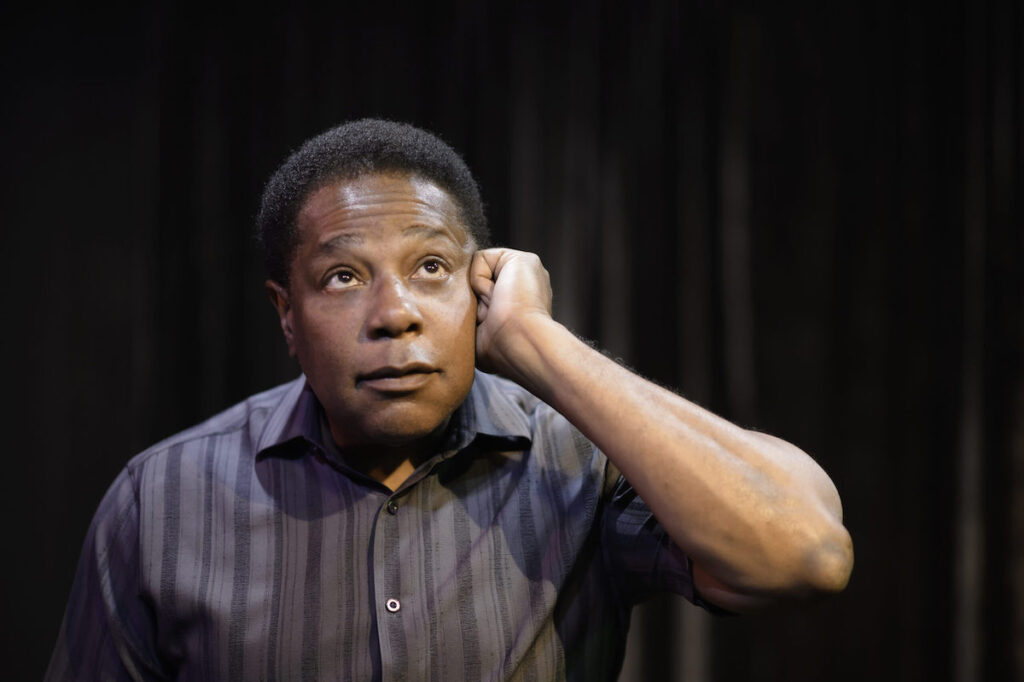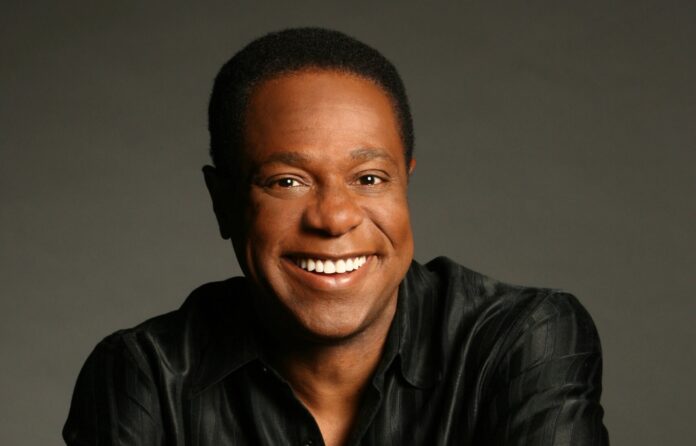Before the show proper began, Brian Copeland walked out to give the audience a bit of context: he never thought he’d do this show again after its 2020 premiere. For starters, that run was cut short by the emergence of the still-ongoing pandemic. Plus, in his own words, “Biden won,” so he thought he’d never need to remount his show about his hearst-stopping worries of a second Trump term. “Who knew?” he lamented.
Indeed, the possibility of a second term under Mein Herr Mar-a-Lago hangs above us once again, which is why Copeland has resurrected and updated The Great American Shit Show (runs through October 24 at both Marsh locations in SF and Berkeley), his solo piece about putting the first four horrible Trump years into both a personal and historical context.
It starts the day after the 2016 election, when Copeland experiences two incidents that he thought inconceivable, given the previous eight years. One incident is when he makes an anti-Trump post on Facebook, only to receive unexpected pushback from the very white woman he (controversially) took to the prom. On a subsequent phone call she repeats MAGA talking points verbatim and claims that any accusations of bigotry are just “liberal propaganda.” Listening to her, Copeland recalls a teenage peer who fell in with a cult. If there’s a more apt simile for the MAGA crowd, I’d love to hear it.

The other incident occurs when Copeland drives across the Bay Bridge post-election morning. He’s cut off by a white driver who shouts “nigger!” at him, almost instinctually. Copeland—who grew up amid both open and hidden racism—figured that the openly bigoted had long since retreated. But the election, he concludes, gave people (white men, in particular) permission to be their worst possible selves.
He comes to the conclusion that the #MeToo backlash played an equal role. Copeland appears to struggle with this power imbalance more, as he was himself falsely accused of being a wanted rapist (the cops fell back on the old chestnut of how he “fit the description of a suspect,” despite the fact that he was performing stand-up during each of the alleged crimes in question.) Such historical victims, Emmitt Till and The Scottsboro Boys, loom large in his consciousness. “‘#BelieveWomen’ comes with extra baggage for Black people,” he says, still unbelieving that Mr. “grab ‘em by the pussy” was elected by such a large female constituency. What’s more, he can’t believe that #MeToo pariahs Bill Cosby, Louis CK, and Kevin Spacey are, respectively, walking free, selling out Madison Square Garden, and have high-profile friends (Sharon Stone, Liam Neeson, Judi Dench) supporting a possible comeback.
Naturally, it takes a Black woman, Copeland’s friend Denise, to provide some much-needed context on both the racial and sexual backlashes that fueled Trump’s 2020 run.
Through it all, Copeland is his affable, vulnerable self, who has become the staple of many Marsh productions. He seems to realize from the beginning of the show that it won’t provide many answers, but that he’d be remiss not to ask how eight years passed of Obama (mostly) trying to “clean up” the mess of America—left behind by both the Dubya years and US history in general—only for them to be undone seemingly overnight by the election of Trump. Copeland’s baffled over how we went from the “Hope” poster to January 6, the end of Roe v. Wade, and Paul Pelosi being attacked in his home.
Performing with no set pieces and only a spotlight, it’s easy to see the effect all of this has had on the playwright: he feels alone. In other words, he feels the same way every marginalized person felt when White America lets its hate flags fly. Copeland’s performance wisely side-steps self-victimization in favor of trauma reflection. After all, what else can you call the aftermath of dealing with the first Trump administration besides PTSD?

As Copeland dissects MAGA’s Reagan-coined/1950s-inspired catchphrase (“If they had told the truth about the 1950s, Grease woulda been a really shitty movie!”) and empathizes with sexual harassment and assault victims like Stormy Daniels, E. Jean Carroll, and the victims of Louis CK (all of whom need round-the-clock protection now.) He clings to a shred of hope in the memory of a certain SF-based DA who kicked ass during a debate on his radio show; a performance she seemingly repeated during a recent televised debate with Trump.
The sparsely-attended performance I witnessed included me amongst, maybe, a dozen others in the Marsh’s SF venue. I was the only one masked, but the one benefit of the intimate crowd was that CO² levels stayed remarkably low on my Aranet4. Over the course of the hour-long show, levels only peaked at 590ppm, dropping by a good 10 or so by the end.
Despite the aforementioned radio-show anecdote, Copeland doesn’t explicitly state his endorsement for the upcoming election. (Quite a few “not-Trump” choices would work well.) Rather, he intentionally ends with the note of optimism in an attempt to gain back the one thing he’s been desperately searching for in the political landscape of the last eight years: hope. Given the history of both the performer and his country, that shouldn’t still be such a hard thing to ask for.
BRIAN COPELAND’S GREAT AMERICAN SHIT SHOW runs through October 24. Both The Marsh locations, SF and Berkeley. Tickets and more info here.






